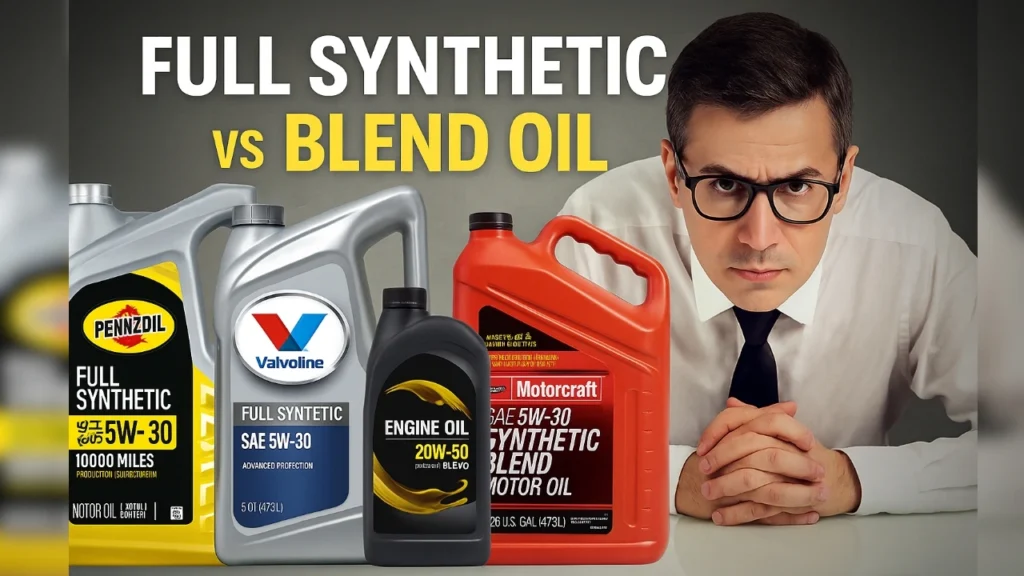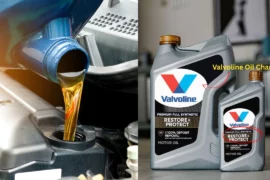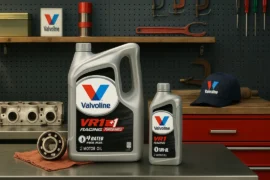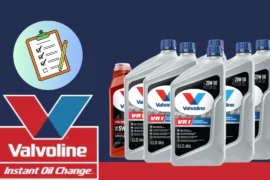Whether you are a DIYer or someone who prefers professional assistance for your vehicle’s upkeep, knowing what goes into your engine is crucial. The type of oil you pour inside can affect everything.
Thus, if you want that automobile of yours to offer top-tier performance and go easy on your pocket in terms of repairs and maintenance, you need to learn which motor oil works best for your engine, driving needs, and where you live.
As a fellow car fanatic, I can vouch for the troubles you can get yourself into after choosing the wrong engine lubricant. It not only causes problems while driving but also leads to unnecessary repairs that, for many, can be out of budget.
To ensure no such thing happens to you, especially in times when both car and gas prices keep creeping up, keep reading. I am sure that by the time you reach the end, you will be able to make an informed decision.
What Is An Engine Oil?
An automobile engine can work well only if its parts are properly lubricated and there is no unnecessary friction. You can ensure this by pouring-in a liquid called engine oil. This oil covers all the moving parts of your car engine and builds a protective layer that ensures smooth operation.
Different Types of Engine Oil:
- Conventional
- Full Synthetic
- Semi-Synthetic or Synthetic Blend
Full Synthetic Oil
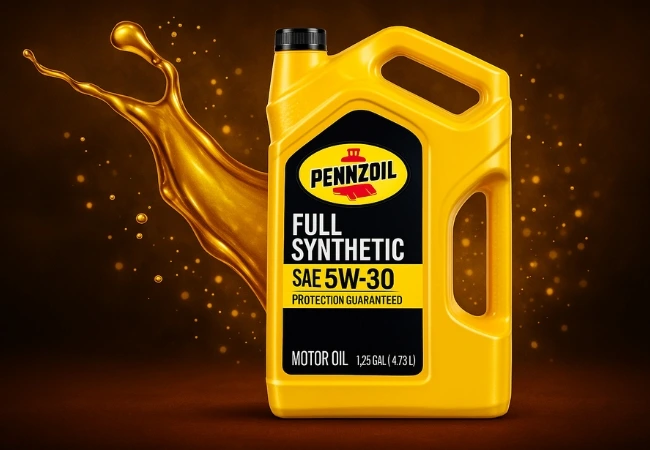
If you want premium care for your car engine, full synthetic is the one to go with. It is made from chemically engineered base oils that are refined at the molecular level. Out of all, this one is cleaner, more consistent, and works well in taking good care of your ride. Whether you prefer to do the oil change at professionals like Valvoline or Jiffy or just by yourself, you will learn that it is the most premium option out there.
It is ideal for latest cars and turbocharged engines, vehicles that are either driven in extreme weather conditions or used for long-distance driving or towing too often.
As per experts, drivers who use this particular oil experience better protection against engine wear, less trouble starting up during cold or hot weather, and longer intervals between oil changes.
Pros and Cons of Full Synthetic Oil
Now that you know what a full synthetic oil is, let us take a closer look at what pros and cons it can offer to its users. Exploring them can help you understand the item better and make an informed buying decision for your car.
Pros
- Superior Engine Protection: It offers the best engine protection against engine wear and tear, especially when you are driving under extreme conditions like towing a trailer, hauling massive loads, etc.
- More Time Between Top-Offs: Full synthetic oil generally lasts longer than other types of engine oils on the market. You can go for as long as 10k miles. These longer oil change intervals reduce your maintenance frequency and burden on your finances.
- Impressive Performance in Extreme Temperatures: Whether you are driving through rough snow or a heatwave, this oil performs well in both high and low temperatures. You get optimal engine performance and reach your destination without a hiccup.
- Cleaner Engines: Compared to other engine oils, this one is less prone to oxidation and sludge formation. Thus, your engine remains cleaner with negligible buildup of harmful deposits.
- Better Efficiency: The smoother the engine operation, the better the efficiency you can get. Full synthetic oil ensures no friction, leading to improved fuel economy and less fuel consumption.
Cons
- Expensive: Out of all kinds of motor oils you can buy, this is the most expensive one. So, if budget is a major issue, think before opting for this one.
- Not Necessary For All: Just because it is the best does not mean every vehicle needs it. Using it for vehicles that are typically used under normal driving conditions, like in-city driving from home to work and vice versa, and more, does not make much sense.
- Not Ideal For Older Engines: Older combustion engines are not designed to handle advanced synthetic lubricants. If you use it in one, it can cause the engine to leak or degrade.
How Does Full Synthetic Oil Work?
Now, let us move forward and learn how this motor oil actually works within the engine.
Lubrication and Friction Reduction
The oil forms a thin and stable film between all the moving parts of your engine to reduce any friction and wear. Its uniform molecular structure ensures thorough lubrication even under extreme conditions and temperatures.
Molecular Uniformity For Better Resistance
As this oil can withstand higher operating temperatures without breaking down, your engine and all its components are safe even when you are pushing it to its limits.
Improved Cold Start Performance
Full synthetic engine oil can flow effortlessly at low temperatures, ensuring faster lubrication during cold starts and reducing any kind of wear and tear.
Additives Ensure Cleanliness
This oil comprises cleaning agents like detergents. While it may seem illogical to have them in engine oil, they help keep the engine clean. They ensure no build-up of sludge or other contaminations within the engine parts.
Breakdown Resistance
The full synthetic oils have great stability and are highly resistant to breakdown under thermal stress and oxidation. This resistance makes the oils last for thousands of miles and prevents issues like oil thickening or engine corrosion.
Synthetic Blend Oil

If you find full synthetic impressive but out of your pocket, there is a perfect alternative called synthetic blend. As the name suggests, it holds some properties of the former but costs way less. Honestly, it is a middle-ground option that can be your savior in times when you are tight on budget but still want better performance.
You can go to any mechanic you like, and you will find them telling you to use a synthetic blend if either your vehicle is past its warranty or was built before 2015, or you simply want maintenance focused on budget.
This one sure does not offer long-lasting performance like full synthetic, but it can ensure your engine is in the right shape. Any vehicle that is generally used for everyday city driving, running errands, and school drop-offs can benefit well from this oil.
Pros and Cons of Synthetic Blend Oil
The synthetic blend is the second-best engine oil present on the market. However, before we move ahead and learn how it is different from pure synthetic, let us dive a little deeper and see what good and bad you can encounter with it.
Pros
- Affordable: This one is quite affordable, given the level of protection it offers over conventional oils. You get many impressive features of full synthetic but at a pocket-friendly cost.
- Low Usage: If you use a synthetic blend in your car, you will see that oil consumption of your engine has reduced. It is because this oil turns into gas or vapor at a slower pace, saving you well on top-offs between oil changes.
- Extended Oil Change Intervals: Synthetic blend offers better oil change intervals than conventional oils but less than the full synthetic ones. But they can easily last up to 7,500 miles, which is a great value.
- Works Great In Moderate Temperatures: In moderate climatic conditions (heat and cold) or driving scenarios, this particular oil can work well, especially when compared to conventional oil.
- Ideal For Older Engines: For any automobile whose model is older than 10 years or has high mileage on it, the synthetic blend can provide the best protection, even better than the full synthetic one.
Cons
- Less Effective in Extreme Conditions: It may not perform well in extreme temperatures and high-stress driving conditions like off-roading, towing, and more.
- May Not Meet All OEM Specifications: As full synthetic oils are becoming common, some OEMs now require their level of capabilities, limiting the compatibility of synthetic blends with upcoming vehicles.
- Mediocre Sludge and Deposit Control: Synthetic blends are better than conventional when it comes to hindering sludge buildup. However, they do not clean as efficiently as full ones.
How Does Synthetic Blend Oil Work?
To know if the synthetic blend is right for your vehicle, first look at how it works to ensure the protection of your engine.
Enhanced Lubrication
This one also offers a uniform molecular structure thanks to the synthetic components in the blend. The engine thus gets better lubrication and less friction between its parts.
Enhanced Temperature Performance
The synthetic blend oil works according to the temperature of your engine. Whether you are starting your car on a cold or hot morning, the oil ensures optimal lubrication. There is no thinning out or no coagulation of the oil.
Oxidation Resistance
Due to being more resistant to oxidation, the blends can remain stable and effective for a long time. You can start your engine day after day without hearing that rumbling noise that indicates a problem.
Presence Of Additives
There are preservatives in this oil that work well in diminishing the formation of any kind of deposits on different engine parts.This ensures a cleaner engine similar to a brand new one and a smoother operation like the engine coming to life with just one push to the ignition.
How Synthetic Blend Oil Falls Short?
The synthetic blend is the best alternative for full synthetic oil. However, it still cannot beat the latter. It lacks many of its superior properties that are worth paying extra money for.
Variable Composition
Unlike full synthetic, it has a variable composition, which affects its effectiveness. The ratio of synthetic to conventional base oils is not standardized. It leads to inconsistent performance, making it hard for users to predict the oil’s behavior under different driving conditions.
Compatibility Concerns
Although ideal for older engines, synthetic blends are still not compatible with all engines. They can not be used in vehicles with certain engine components or seals that are exclusively designed to be used with full synthetic oils.
Reduced Efficiency
Despite having parts of synthetic, the blend oils are unable to provide the same level of efficiency enhancement. It is mainly because it is a mixture and lacks the quality of purity.
Not Ideal For Advanced Engines
These oils are unable to provide sufficient protection for advanced or high-performance engines, especially those that operate under extreme temperatures or heavy loads.
Full Synthetic vs. Synthetic Blend
Price should not be your only factor in deciding which oil should go in your car engine. You need to factor in the pros and cons and even your driving habits, where you live, and your long-term car maintenance goals.
While both synthetic and blend are top-tier options, they are not for everyone and every car. Comparing the two side by side is the only way to learn how they stand against each other.
Cost Per Quart
Full synthetic is costlier than the blend. It will cost you around $7 to $10, whereas the same amount of blend cuts back at $4 to $6. If budget is a major concern for you, the latter is an obvious choice.
Temperature Resistance
The synthetic blend can handle varying temperatures, but it is the full synthetic that works wonders in extreme scenarios. Whether you are driving through the snow-covered roads of Chicago or the melting heat of Florida, the latter is the one to go with.
Refilling Intervals
One of the worst things about using poor-quality motor oil is that it requires frequent changes, which can empty your pocket. If you do not want that, blend and full synthetic oils are better options than conventional. However, the better one out of the two entirely depends on you. If you have less than 10,000 miles on your ride in a year, go for the blend. If not, then full synthetic.
Fuel Efficiency
The fuel economy of your vehicle is directly associated with how well the engine performs. The lesser the frictionor resistance, the better performance you can get. Full synthetic is known for offering better performance, especially in modern and complicated engines.
Wear Protection
Your car engine is prone to wear and tear if there is continuous friction. But the good thing is that with the right oil, you can ensure no damage is done. If long-term reliability is what you are after, look no further than the fully synthetic oil.
Your Vehicle Type
If you own a newer release, you will find most manufacturers recommending full synthetic engine lubricant. But if you own an older model or a model no older than 10 years but with high mileage on it, the synthetic blend is a much more sensible choice. This is the exact thing I do with my mom’s 2012 Camry, which has over 140k miles on it. She requires an oil change every 5k miles but hasn’t encountered any major issues till now.
Your Driving Habits
How much you drive and the way you handle your ride on the road also dictate what type of oil should go in your engine. If you use your beloved vehicle for everyday commutes and once in a while for a road trip, a synthetic blend is great. However, if you haul or tow heavy items or operate your four-wheeler for longer hours on a daily basis, go for that premium oil.
When Should You Choose Full Synthetic?
If you put your vehicle through rigorous labor, whether through your extreme driving habits, operating temperatures, or work demands, you need superior engine protection. Currently, full synthetic is the best oil that can offer top-tier protection in any condition you put your vehicle through.
This is not the thinking of just the people selling it, but also the ones consuming it. You can explore different automotive forums online and will find people appreciating how using full synthetic oil on their vehicles has made them see the visible difference from the times when they used to use other types of oils.
If you ask me, I am also a firm supporter of premium motor oil. It provides an extra layer of safety, especially when you frequently find yourself in stop-and-go traffic, a common occurrence in urban settings.
When Is Synthetic Blend the Ideal Choice?
If you drive a vehicle that came out over 10 years ago (whether new or used) or it has high mileage on it because you simply love to drive and want to ensure you continue the effortless journey, a synthetic blend is the ideal choice. It provides almost a similar level of protection but at a much cheaper price.
You can also consider this one if your car maintenance schedule compels you to change oil frequently. Overall, if you are looking for a way to get advanced protection for your engine but also do not wish to spend extravagantly, this is the way to go.
Can I Switch Between the Two Oils?
Not many American drivers are familiar with the fact that they can shift from one engine oil to another without worrying about their engine health. All you need to ensure is that the new oil falls under the guidelines of your car manufacturer and is of recommended quality. To know this, you can refer to your owner’s manual. There you will find all types of oil your car is compatible with.
As a fellow car owner, I can tell you that switching oil is safe. However, there is always a benefit to remaining consistent with the brand you’ve started out with. It avoids the scenario of you giving your ride time to adjust to the new oil and cutting back on performance in the beginning. This surprise scenario will always be there every time you switch.
Another important thing every car owner should know is to never mix oil types. You may think you are acting smart, but instead you will end up with a busted engine.
What Fellow Drivers Are Saying About Engine Oils
Every driver has different demands, and this difference extends from buying a car to buying engine oil. You can easily find several fellow drivers online sharing the visible difference between full synthetic and synthetic blend.
One user shared how switching to a synthetic blend in his pre-owned car, which has substantial miles on it, has made his driving experience much better. Their engine not only runs smoother, but the switch has been easy on his pocket.
Similarly, many industry experts, independent mechanics, and repair shops are also frequently seen sharing insights with the public. Most of them recommend the premium full synthetic for modern engines and drivers who want to be less concerned about the maintenance of their cars.
How to Choose the Right Oil in 2025
If this year you want to ensure your car engine performs well no matter what hardship you put it through, the right oil is necessary for proper lubrication. Here’s what you should keep in mind:
- Check your owner’s manual for manufacturer recommended oil.
- Good quality oil will have AIM or OEM certification.
- Account in the climatic conditions, like rainy, stormy, hot, snowy, etc., of where you live.
- Take into account your driving requirements, long-distance or in-city travels.
- Stick to the oil that meets your essentials.
- Avoid full synthetic if the blend fits the bill.
- Make a strict budget and stick to it.
- Watch for rebates and oil change coupons.
In short, do not over or underspend on the oil purchase. Avoid emotional buying. Consider what your engine needs and opt for the one that can offer it better protection under your budget. And if you are considering a professional for your next oil change, I would recommend a Valvoline 18-point inspection oil change.
Quick Summary About Full Synthetic vs. Synthetic Blend Oils
Before we move forward and deduce which motor lubricant is right for you and your engine, let us first have a quick recap of what we’ve learned about full synthetic and synthetic blend oils.
| Feature | Full Synthetic Oil | Synthetic Blend Oil |
| Sludge & Deposit Control | Superior resistance due to advanced additives. | Moderate resistance |
| Composition | 100% chemically engineered base oils | A mix of synthetic and conventional oils |
| Molecular Structure | Uniform | Varying |
| Impurities | Fewer | more impurities than full synthetic. |
| Engine Protection | Ensure there is no corrosion buildup or premature wear | Everyday driving, Standard conditions, Performance and cost balance |
| Oxidation Resistance | High resistance to oxidation, reducing the formation of harmful deposits. | Better than conventional oils but falls short with full synthetic. |
| Oil Change Intervals | Longer intervals, often around 10,000 to 15,000 miles or more. | Shorter intervals, typically between 5,000 to 7,500 miles. |
| Temperature Performance | Superior performance in extreme temperatures. | Inferior performance compared to full synthetic |
| Viscosity Stability | Typically remains uniformacross different temperatures. | May thin out more quickly in extreme conditions. |
| Lubrication | Superior engine lubrication. Reduces friction effectively. | Good lubrication but slightly less effective than full synthetic. |
| Cost | Expensive due to the advanced engineering process. | More affordable than full synthetic. |
| Environmental Impact | The production process can be more energy-intensive. | Frequent change has more environmental effects. |
| Best Suited For | High-performance vehiclesCars subjected to extreme conditionsOptimal protection | Every day driving, Standard conditions, Performance and cost balance |
Which Oil Should You Choose?
Full synthetic and synthetic blend are the most popular engine oil options. The former is right for new or high-performance car owners and people who want longer intervals between oil changes. The latter is for vehicles that have run their performance course and are now best companions as everyday commuters.
Whether you are a first-time car owner or an experienced player in the field, knowing the anatomy of engine lubricants can help you take much better care of your vehicle and save you from unnecessary spending.

